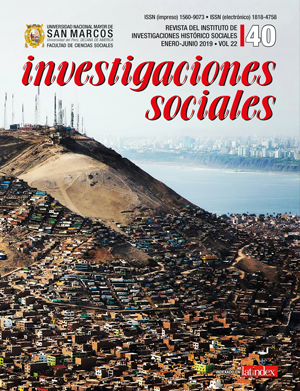The 1899 Presidential elections according to Lima’s political press
DOI:
https://doi.org/10.15381/is.v22i40.15929Keywords:
Elections; press; public politics; Partido Civil; Partido Demócrata.Abstract
Presidential elections are a space of broad public debate, a vent of ideological passions, confrontation of ideas, among other aspects that we can find thanks to the press diffusing role, responsible for describing occurred events. It is important to point out that newspapers played a central role, especially during pre-electoral contexts or in actual elections, either to forge the image for or against a candidate. On this matter, information contrast from various newspapers and even the memories of prefects, witnesses of the time among other sources, allowed us to approach reality objectively and thus demystify the so-called Aristocratic Republic (1899-1919) labeled by some historians as a space of social and political stability. On the contrary, what is exposed in the press shows us a time of great tension and confrontation at the dawn of the 20th century. An example is 1899 presidential elections, which we study from descriptions made by the main newspapers of the capital city as El Comercio, El Germinal, among others.
Downloads
Published
Issue
Section
License
Copyright (c) 2019 Jorge García Escobar, María Mendoza Méndez, Emilio Rosario Pacahuala

This work is licensed under a Creative Commons Attribution-NonCommercial-ShareAlike 4.0 International License.
AUTHORS RETAIN THEIR RIGHTS:
a. Authors retain their trade mark rights and patent, and also on any process or procedure described in the article.
b. Authors retain their right to share, copy, distribute, perform and publicly communicate their article (eg, to place their article in an institutional repository or publish it in a book), with an acknowledgment of its initial publication in Investigaciones Sociales.
c. Authors retain theirs right to make a subsequent publication of their work, to use the article or any part thereof (eg a compilation of his papers, lecture notes, thesis, or a book), always indicating the source of publication (the originator of the work, journal, volume, number and date).






